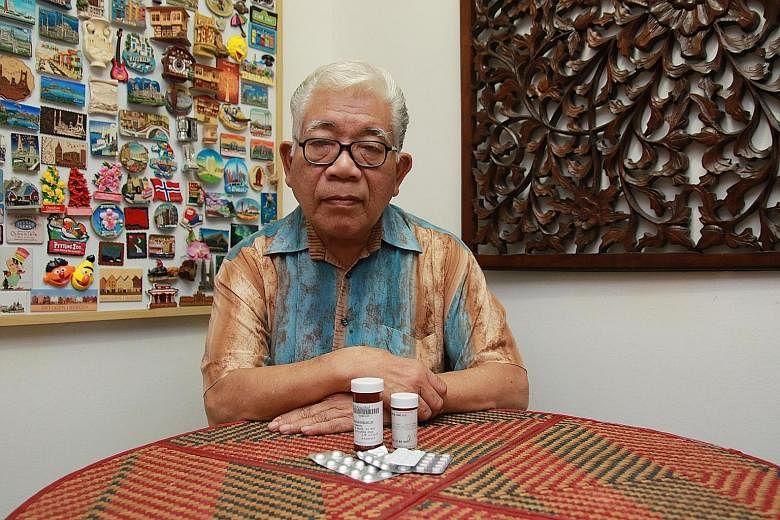Taking medicine is no straightforward matter for people who have several chronic ailments.
They may have to take multiple pills at different times of the day and in varying dosages.
There is also a danger that the different medications may interact with one another, leading to harmful side effects.
Mr Abdul Aziz Ismail, 70, was diagnosed with gout this year. He also has heart issues and mild prostate gland enlargement.
In all, he takes six different medications.
Mr Aziz, who works as a customer service associate, said: "Some of my doctors have told me that if I'm on one medication, I should not be taking the other kind because it might cause side effects."
Doctors generally use the term polypharmacy to refer to the taking of five or more medications daily by such patients.
Polypharmacy is a growing phenomenon worldwide because people are living longer. It is especially prevalent in ageing populations.
Dr Soong Jie Lin, a senior clinical pharmacist at Singapore General Hospital, said: "As one ages, one tends to present with more chronic medical problems, which are then treated with multiple medications."
In Singapore, a study done by Changi General Hospital last year of 55 hospitalised patients, aged 65 and above, found that 94.5 per cent suffered from multiple chronic conditions and all of them were taking multiple medications.
More than half had nine or more different medications.
-
List your medications and know them well
-
Patients have the responsibility of keeping track of their medications.
Knowing what their patients are on helps doctors to devise the optimal combination of drugs.
Here are some ways patients can help themselves and their doctors:
1. Make a complete list of all your medications
Bring this list along whenever you see a doctor or pharmacist. "This allows the doctor or pharmacist to better understand your medication regimen," said Dr Soong Jie Lin, a senior clinical pharmacist at Singapore General Hospital.
The list should include every medication you are taking, including supplements or over- the-counter drugs.
You can also ask about any possible interactions between the medications.
2. Know your medications well
Ask your doctor or pharmacist for critical information such as the names of the medications you are taking, what each is for, the strength of dosage, and how each medication should be taken.
Including these details in your list will also help doctors and pharmacists.
Alternatively, you can take along your medications when seeing a doctor.
3. Avoid taking any new medication without first consulting your doctor, pharmacist, or both
Patients sometimes buy medication over the counter to manage minor ailments, without realising that it may interact with existing medication for chronic conditions, said Dr Soong.
If you are consulting more than one doctor, make sure each one knows what the others have prescribed.
Lester Wong
While polypharmacy is not in itself harmful and may indeed be necessary in many cases, it can become a problem if not properly managed.
For example, painkillers are often prescribed for gout.
But some painkillers would not be suitable for patients who also have heart problems, as they can worsen the water retention symptomatic of that condition, said Dr Nur Farhan Mohammad Alami, a specialist in geriatric medicine and consultant at Raffles Internal Medical Centre.
The big challenge for doctors is to differentiate when it is appropriate to prescribe multiple medications and when the harm outweighs the benefits of medication, said Dr Samuel Chew, a senior consultant geriatrician at Changi General Hospital.
Side effects that arise from taking different medications vary widely, depending on the kinds of medication taken, and can include loss of appetite and dizziness.
However, severe side effects that can be fatal are very rare.
A 2012 study found that medication for high blood pressure and the heart were the most common in drug combinations that produced adverse side effects.
Exacerbating the problem is the lack of guidelines that take the complex needs of elderly patients with multiple co-existing conditions into account.
Dr Chew said: "Clinical practice guidelines on which treatments are prescribed are often based only on a single disease and do not take into account drug-drug and drug- disease interactions."
To complicate matters, patients sometimes neglect to inform the different doctors they see about all the medications they are taking.
AGEING CAN AFFECT DRUG'S EFFECTS
Physiological changes as part of ageing can also alter the effects drugs have on the human body.
"Many patients tell me they have been on a drug for 30 years and the side effect they experience cannot be due to the drug," said Dr Nur Farhan. "But as they get older, their bodies change, even if the medication does not, and side effects can develop in people who have otherwise been well before."
All these factors can lead to unwanted side effects, which can further be misdiagnosed as symptoms of another condition, with more medication being prescribed unnecessarily.
In what is known as a prescription cascade, the unnecessary medications taken can subsequently increase the risk of more adverse drug reactions.
Avoiding inappropriate poly- pharmacy is a two-way effort requiring patients to work together with the doctors and pharmacists who treat them.
On the one hand, doctors and pharmacists can try to determine the list of medications a patient is taking from cross-referencing various medical records.
Developing clinical guidelines that clearly distinguish between appropriate or inappropriate polypharmacy will also help.
There are also pharmacy outreach and home-care programmes, where pharmacists work closely with doctors and nurses who go on home visits to identify any problems patients may have with their medications.
Ultimately, however, it is the patients and their caregivers who must know their medications well and take ownership of their treatment.
Dr Nur Farhan said: "A complete medical history, including a list of current medications, over-the- counter drugs and traditional medicine, helps doctors to identify symptoms that may be a side effect of an existing drug a patient is taking. The benefits of the drug can then be weighed against the side effect and a decision made to continue or discontinue taking it."
This can sound like a tall order for an older patient, but Mr Aziz sees it as necessary.
"Before the doctors prescribe, I tell them what other medications I take, so there will be no clashes," said Mr Aziz.
"It's for my own safety and well-being. I will suffer the consequences if I don't tell the doctors."
He also makes sure he can tell what each medication he takes is for and avoids making any adjustments to his medication regimen on his own.
"I follow exactly what the labels say and try not to be too smart," said Mr Aziz.
Dr Soong gave this advice: "If patients or their caregivers are unsure of how to come up with a complete medication list, they can ask a pharmacist to help them with it."


